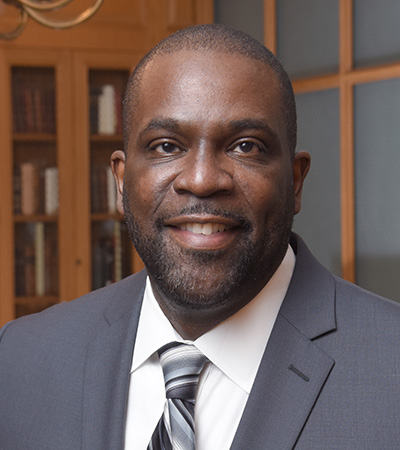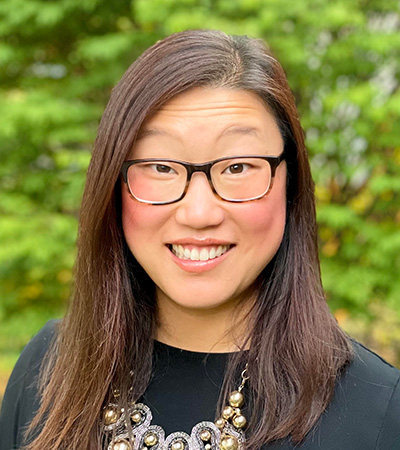Honors for DeBose–Boyd, Michel and Nelson
DeBose–Boyd receives TAMEST prize
The Texas Academy of Medicine, Engineering, Science and Technology awarded the 2024 Hill Prize to Russell DeBose–Boyd. This is a new award designed to accelerate high-risk, high-reward research ideas in Texas with significant potential for real-world impact. Recipients will receive $500,000 to advance groundbreaking science and highlight Texas as a premier destination for world-class research.

DeBose–Boyd is a distinguished chair in biomedical science and a professor of molecular genetics at the University of Texas Southwestern Medical Center. His research investigates the feedback mechanisms that control the synthesis of cholesterol.
Since 2017, DeBose–Boyd has served as an associate editor of the Journal of Lipid Research. He is the ASBMB’s interim treasurer and a member of the Nominating Committee. In addition, he is a mentor for the ASBMB Maximizing Opportunities for Scientific and Academic Independent Careers K99/R00 program and a member of the ASBMB Deuel meeting board. He received the ASBMB’s 2023 Avanti Award in Lipids and is a member of the National Academy of Sciences.
“It’s an honor to be recognized by Lyda Hill Philanthropies and TAMEST with this elite group of researchers making advances in so many different fields,” DeBose–Boyd said. “These funds will help advance our work to better understand how cholesterol is produced.”
Michel wins DEI award
Lea V. Michel has been awarded the Faculty Beacon Award by the Rochester Institute of Technology’s division of diversity and inclusion. This award recognizes a faculty member’s work to enhance diversity and inclusion both on and off the RIT campus.

Michel is a professor of chemistry and materials science and the director of diversity, equity and inclusion in the College of Science at RIT. Her research focuses on finding diagnostic biomarkers for Gram-negative sepsis. In addition, her lab studies protein vaccine candidates for nontypeable Haemophilus influenza, a commensal bacterium in the human nasopharynx that can cause pneumonia, meningitis, sinusitis, acute chronic obstructive pulmonary disease exacerbations and ear infections.
In 2021, Michel won the American Society for Biochemistry and Molecular Biology Early-Career Leadership Award. She also received the 2023 ChemCUR Outstanding Mentor Award from the Council on Undergraduate Research for her transformative mentoring and advising of undergraduate students in mentor-led chemistry research projects. She serves as the chair of the ASBMB Maximizing Access Committee.
Michel received the Faculty Beacon Award at the RIT division of diversity and inclusion’s eighth annual Celebration of Excellence program in April.
Nelson named Churchill scholar
Of the 16 Winston Churchill Scholars in science, math and engineering named recently, one is an American Society for Biochemistry and Molecular Biology member, Theodore Nelson. This program fulfills Churchill's vision of deepening the partnership between the U.S. and the U.K. to advance science and technology.

Nelson is an undergraduate at Columbia University studying computer science. His research focuses on the intersection between biological and computational sciences, specifically in the application of long-read sequencing technologies to long noncoding RNA biology and epitranscriptomics. He presented a project based on his research, at DiscoverBMB 2024. Nelson is a long-time member of the Columbia Space Initiative, a student program for mission teams that design satellites and astronaut tools, build rockets and conduct microgravity experiments.
The Churchill scholarship provides one year of master’s study at Churchill College, Cambridge. Nelson plans to pursue an M.Phil. in medical science to study single-cell spatial atlases of tissue microenvironments in the Teichmann group. The award covers full tuition, a competitive stipend, travel costs and the chance to apply for a $4,000 research grant.
“Theo has taken full advantage of the STEM research resources available here at Columbia, and I know he’ll do the same at Cambridge,” Ariella Lang, associate dean of academic affairs and director of undergraduate research and fellowships at Columbia, said. “We are excited to see where his research journey takes him.”
Enjoy reading ASBMB Today?
Become a member to receive the print edition four times a year and the digital edition monthly.
Learn moreGet the latest from ASBMB Today
Enter your email address, and we’ll send you a weekly email with recent articles, interviews and more.
Latest in People
People highlights or most popular articles

Building a career in nutrition across continents
Driven by past women in science, Kazi Sarjana Safain left Bangladesh and pursued a scientific career in the U.S.

Kiessling wins glycobiology award
She was honored by the Society for Glycobiology for her work on protein–glycan interactions.

2026 ASBMB election results
Meet the new Council members and Nominating Committee member.

Simcox wins SACNAS mentorship award
She was recognized for her sustained excellence in mentorship and was honored at SACNAS’ 2025 National Conference.

From humble beginnings to unlocking lysosomal secrets
Monther Abu–Remaileh will receive the ASBMB’s 2026 Walter A. Shaw Young Investigator Award in Lipid Research at the ASBMB Annual Meeting, March 7-10 in Washington, D.C.

Chemistry meets biology to thwart parasites
Margaret Phillips will receive the Alice and C. C. Wang Award in Molecular Parasitology at the ASBMB Annual Meeting, March 7-10 in Washington, D.C.
